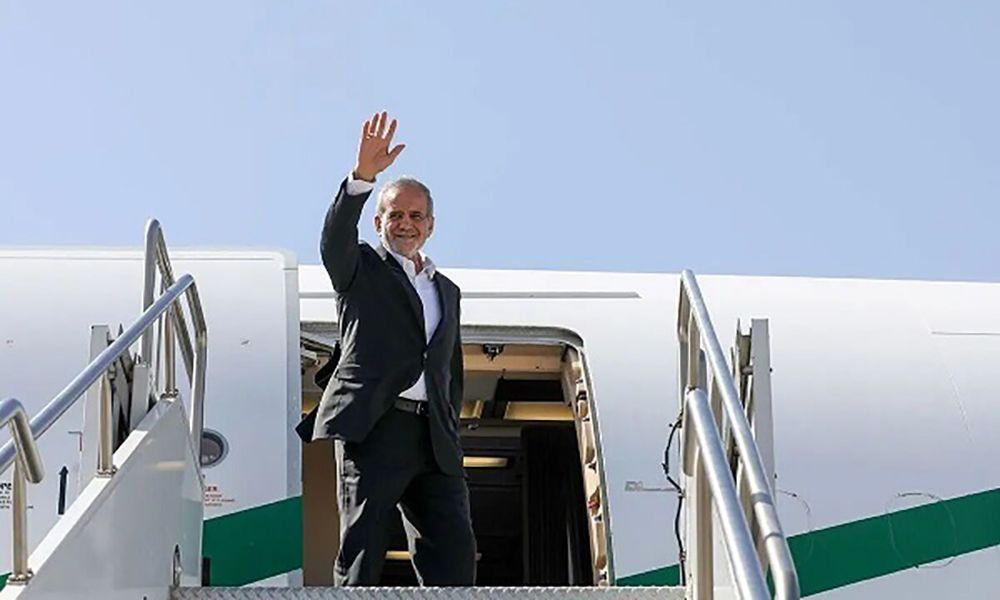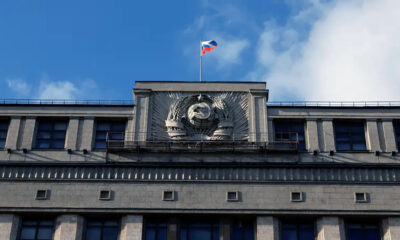Regional
Indian hospitals hit as doctors strike to protest brutal rape of medic
A 31-year old trainee doctor was raped and murdered last week inside a medical college in Kolkata where she worked, triggering nationwide protests among doctors and drawing parallels to the notorious gang rape and murder of a 23-year-old student on a moving bus in New Delhi in 2012.

Hospitals and clinics across India turned away patients except for emergency cases on Saturday as medical professionals started a 24-hour shutdown in protest against the brutal rape and murder of a doctor in the eastern city of Kolkata.
More than one million doctors were expected to join the strike, paralysing medical services across the world's most populous nation. Hospitals said faculty staff from medical colleges had been pressed into service for emergency cases, Reuters reported.
The strike, which began at 6 a.m. (0030 GMT), cut off access to elective medical procedures and out-patient consultations, according to a statement by the Indian Medical Association.
A 31-year old trainee doctor was raped and murdered last week inside a medical college in Kolkata where she worked, triggering nationwide protests among doctors and drawing parallels to the notorious gang rape and murder of a 23-year-old student on a moving bus in New Delhi in 2012.
Outside the RG Kar Medical College, where the crime took place, a heavy police presence was seen on Saturday while the hospital premises were deserted, according to the ANI news agency.
Mamata Banerjee, the chief minister of West Bengal, which includes Kolkata, has backed the protests across the state, demanding the investigation be fast tracked and the guilty be punished in the strongest way possible.
A large number of private clinics and diagnostic centres remained closed in Kolkata on Saturday.
Dr Sandip Saha, a private paediatrician in the city, told Reuters that he will not attend to patients except in the case of emergencies.
In Odisha state, patients were queuing up and senior doctors were trying to manage the rush, Dr. Prabhas Ranjan Tripathy, additional medical superintendent of All India Institute of Medical Sciences in the city of Bhubaneswar, told Reuters,
“Resident doctors are on full strike, and because of that, the pressure is mounting on all faculty members, which means senior doctors," he said.
Patients queued up at hospitals, some unaware that the agitation would not allow them to get medical attention.
“I have spent five hundred rupees on travel to come here. I have paralysis and a burning sensation in my feet, head, and other parts of my body," a patient at SCB Medical College Hospital at Cuttack in Odisha told a local television channel.
"We were not aware of the strike. What can we do? We have to return home."
Anger at the failure of tough laws to deter a rising tide of violence against women has fuelled protests by doctors and women's groups.
"Women form the majority of our profession in this country. Time and again, we have asked for safety for them," IMA President R. V. Asokan told Reuters on Friday.
India's Central Bureau of Investigation, the agency investigating the rape and murder, has summoned a number of medical students from the RG Kar college to ascertain the circumstances of the crime, according to a police source in Kolkata.
The CBI also questioned the principal of the hospital on Friday, the police source said.
Regional
Iran’s president to make rare visit to Egypt for D-8 summit
Iran will discuss regional and bilateral affairs with the participating countries on the sidelines of the summit, Baghaei added.

Iranian President Masoud Pezeshkian will take part in a summit of big Muslim countries in Egypt on Thursday, Foreign Ministry spokesperson Esmaeil Baghaei said, the first visit by an Iranian president to Egypt in more than a decade, Reuters reported.
Egypt is hosting the summit of the D-8 Organization for Economic Cooperation, which also includes Bangladesh, Indonesia, Malaysia, Nigeria, Pakistan and Turkey.
Relations between Egypt and Iran have generally been fraught in recent decades but the two countries have stepped up high-level diplomatic contacts since the eruption of the Gaza crisis last year as Egypt tried to play a mediating role, read the report.
Iran's Foreign Minister Abbas Araqchi travelled to Egypt in October to discuss regional issues with Egyptian officials, while his Egyptian counterpart Badr Abdelatty travelled to Tehran earlier in July to attend Pezeshkian's inauguration.
"We have the important summit... known as D-8 in Egypt, the foreign minister will take part in the ministerial conference and then the summit will be held with the participation of the president," Baghaei said in a weekly televised news conference.
Iran will discuss regional and bilateral affairs with the participating countries on the sidelines of the summit, Baghaei added.
The D-8 was established in 1997 to improve cooperation between countries stretching from Southeast Asia to Africa.
Regional
Bomb kills chief of Russian nuclear protection forces in Moscow

A bomb hidden in an electric scooter killed a senior Russian general in charge of nuclear protection forces in Moscow on Tuesday, Russia’s investigative committee said.
Lieutenant General Igor Kirillov, who is chief of Russia’s Nuclear, Biological and Chemical Protection Troops, was killed outside an apartment building on Ryazansky Prospekt, which starts a road some seven km (4 miles) southeast of the Kremlin, Reuters reported.
“Igor Kirillov, the head of the radiation, chemical and biological protection forces of the armed forces of the Russian Federation, and his assistant were killed,” the investigative committee said.
Photographs posted on Russian Telegram channels showed a shattered entrance to a building littered with rubble and two bodies lying in the blood-stained snow.
Reuters footage from the scene showed a police cordon. A criminal case has been opened.
Russia’s radioactive, chemical and biological defense troops, known as RKhBZ, are special forces who operate under conditions of radioactive, chemical and biological contamination.
On Monday, Ukrainian prosecutors charged Kirillov in absentia with the alleged use of banned chemical weapons in Ukraine, the Security Service of Ukraine said, according to the Kyiv Independent.
Russia denies those accusations.
Britain in October sanctioned Kirillov and the nuclear protection forces for using riot control agents and multiple reports of the use of the toxic choking agent chloropicrin on the battlefield.
Regional
Hezbollah chief says group lost its supply route through Syria

Hezbollah head Naim Qassem said on Saturday that the Lebanese armed group had lost its supply route through Syria, in his first comments since the toppling of President Bashar al-Assad nearly a week ago by a sweeping rebel offensive.
Under Assad, Iran-backed Hezbollah used Syria to bring in weapons and other military equipment from Iran, through Iraq and Syria and into Lebanon. But on Dec. 6, anti-Assad fighters seized the border with Iraq and cut off that route, and two days later, rebels captured the capital Damascus.
"Yes, Hezbollah has lost the military supply route through Syria at this stage, but this loss is a detail in the resistance's work," Qassem said in a televised speech on Saturday, without mentioning Assad by name, Reuters reported.
"A new regime could come and this route could return to normal, and we could look for other ways," he added.
Hezbollah started intervening in Syria in 2013 to help Assad fight rebels seeking to topple him at that time. Last week, as rebels approached Damascus, the group sent supervising officers to oversee a withdrawal of its fighters there.
More than 50 years of Assad family rule has now been replaced with a transitional caretaker government put in place by Hayat Tahrir al-Sham, a former al Qaeda affiliate that spearheaded the rebel offensive.
Qassem said Hezbollah "cannot judge these new forces until they stabilise" and "take clear positions", but said he hoped that the Lebanese and Syrian peoples and governments could continue to cooperate.
"We also hope that this new ruling party will consider Israel an enemy and not normalise relations with it. These are the headlines that will affect the nature of the relationship between us and Syria," Qassem said.
Hezbollah and Israel exchanged fire across Lebanon's southern border for nearly a year in hostilities triggered by the Gaza war, before Israel went on the offensive in September, killing most of Hezbollah's top leadership.
-

 Latest News4 days ago
Latest News4 days agoAfghanistan seals T20I series victory over Zimbabwe
-

 World4 days ago
World4 days agoSyrian clerics in former Assad stronghold call for national unity, democracy
-

 Latest News4 days ago
Latest News4 days agoU.S. sentences Afghan man to 30 years in prison for narco-terrorism and witness tampering
-

 International Sports3 days ago
International Sports3 days agoMessi vs Ronaldo: A look at their market values over the years
-

 Latest News4 days ago
Latest News4 days agoInvestment in Afghanistan’s pharmaceutical sector reaches $300 million: Union
-

 Latest News4 days ago
Latest News4 days agoChinese, Tajik officials discuss Afghanistan
-

 Sport4 days ago
Sport4 days agoAfghanistan’s Gulbaddin Naib fined 15% of match fee for dissent
-

 Regional3 days ago
Regional3 days agoHezbollah chief says group lost its supply route through Syria
























